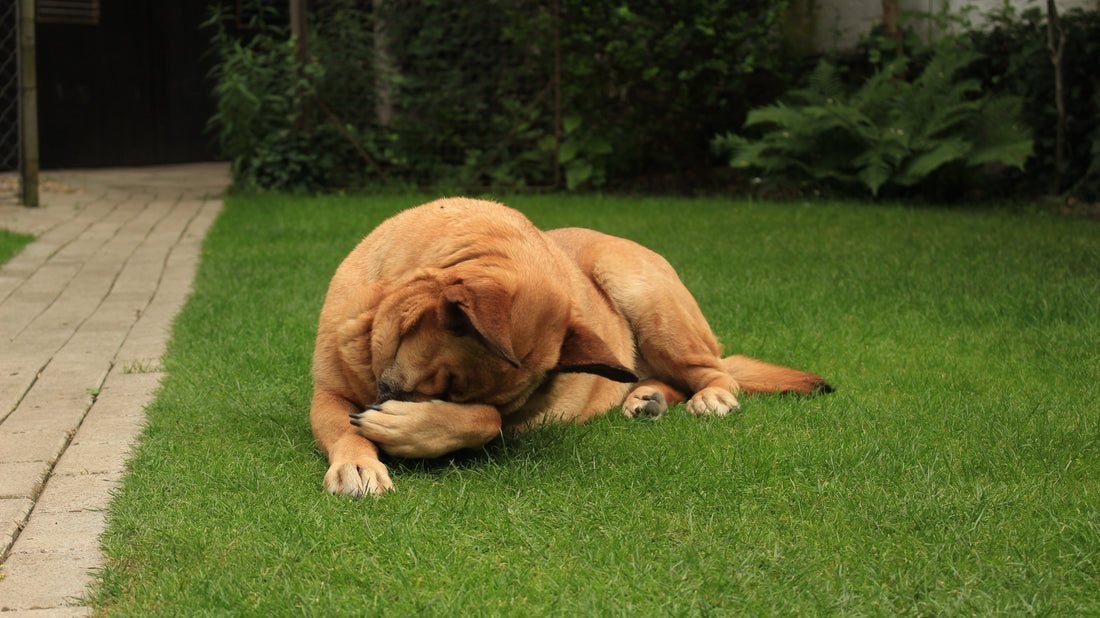If your dog eats poop, you may be surprised to learn that you’re not alone!
The official name for this behavior is coprophagy, or coprophagia, and despite being quite disgusting, it’s actually quite common among dogs.
According to the American Kennel Club, “It’s in a dog’s DNA to eat poop.” And they consider the behavior to be, “an innate predisposition”. While the behavior itself may not be terribly worrisome, the potential causes should be, as they may indicate a health or behavioral issue that needs to be addressed.
Reasons Why Dogs Eat Poop
Age
A dogs age can actually play a significant role in behavior, including eating poop.
Puppies often eat poop simply because they are mimicking their mother. Mother dogs may eat the stool of their puppies as an inherent and primitive behavior that developed to protect their puppies from predators, and from spreading potential disease.
Senior dogs may eat poop for a very different reason, including a lack of nutrients in their daily diet, as well as malabsorption problems that can occur with age.
Survival
Throughout history, dogs have practiced coprophagy as a survival tactic to prevent starvation.
Lack of Food and Confinement
Eating feces is not uncommon among dogs that are confined to small spaces, underfed, and mistreated. Sadly, this describes the life of a Puppy Mill breeder dog. Surprisingly, in 2023, Puppy Mills are still operating in the US, in fact, they are thriving, often operating under the guise of a “rescue”. A staggering 1.5 million cats and dogs are euthanized in the US every year. Yet there remains an insatiable demand for puppies among the uninformed that continues to propel the puppy mill industry.
Pack Hierarchy
Sometimes a healthy dog will consume poop from a weaker dog in the household in an attempt to establish dominance. When this happens, there are often other signs, including aggressive behavior towards the dog that is considered to be lower in the pack hierarchy. It’s important to recognize this behavior and take steps to stop and correct it.

Attention Seeking
Some dogs learn that eating poop garners attention. Unfortunately, when a dog does not receive regular attention from their people, they quickly learn that behaviors like eating poop, elicits the attention they are seeking, even if it is negative.
Poor Digestion and Malabsorption
If your dog is eating the poop of another dog (or another animal), it's likely doing so because they are not receiving enough nutrients. Certain health issues in dogs can cause malabsorption of nutrients.
The #1 symptom of malabsorption in dogs is weight loss, despite a healthy appetite and eating normally. Another symptom is eating unusual things, such as trash and poop!
How Do I stop My Dog from Eating Poop?
Determine the Cause
The key to preventing unwanted behavior in dogs always starts with understanding and assessing the cause. Once that has been determined, you can then take the necessary steps to work with your dog to prevent the behavior.
When addressing coprophagy, it’s important to determine if the cause is behavioral or a health related. In order to determine this, step number one is to rule out any serious health problems with a visit to your veterinarian.
Certain conditions, including diabetes, thyroid disease, Cushing’s disease, parasites, and more can cause an increase in a dog’s appetite, leading to eating poop. During the visit, your vet should do blood work to assess kidney and liver function, as well as test your dog’s stool for parasites.

If the underlying cause turns out to be a medical condition, the appropriate treatment should stop the behavior.
If it’s shown to be behavioral in nature, it is recommended to always immediately remove any stool from your dog’s environment, and work with your them using positive reinforcement to discourage the behavior.
Add Supplements
Because Coprophagy can develop due to a lack of nutrients, Veterinarians recommend adding a multivitamin supplement to provide the necessary vitamins and minerals your dog needs.

In addition, adding a probiotic to your dog’s daily diet will boost their immune system while promoting normal digestion.
Related Blog Posts:
- What Your Dog's Stool Means - The Scoop on Poop
- Why Do Dogs Eat Grass?
- Quirky Dog Behaviors Explained
Products related to this article:
Every Sale Supports a Shelter Pet. Learn More.
Created in Vermont. Learn More.
If you suspect your pet is sick, call your vet immediately. For health-related questions, always consult your veterinarian, as they have examined your pet, know the pet's health history, and can make the best recommendations for your pet.














